Category: Cardinal Quarter
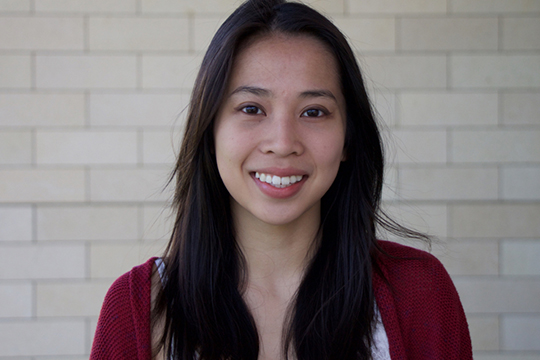
Living sustainably
By Thazin, ’15 (Electrical Engineering), MS ’16 (Sustainable Design and Construction)
Starting the day off with a nice morning jog, I arrive early at the Union of Concerned Scientists’ (UCS) headquarters in Cambridge, Massachusetts. After I’m done with a quick shower, more UCSers trickle in, many of whom took the subway or bus or biked over from various parts of the Greater Boston Area. For these clean energy warriors, the commitment to a sustainable planet starts even before the official work day begins.
As a Schneider Fellow, I had my own humble part to play at UCS. With the Climate and Energy team, I wrote reports on how community solar works and how the business models for electric utilities are evolving. While these topics may seem unrelated, they are both important pieces for enabling greater penetration of renewable energy from the different sides of the electricity meter.
The crucial lesson I learned that summer, however, was how those at UCS modeled hard work and integrity.
From informing the public with editorials to advocating for policy changes based on facts and rigorous analyses, every member of UCS worked relentlessly to fight for a healthier, safer world. As I enter the solar industry post-graduation, I will continue to do the same!
Schneider Fellows work at leading U.S. nongovernmental organizations (NGOs) to tackle today’s sustainable energy challenges.
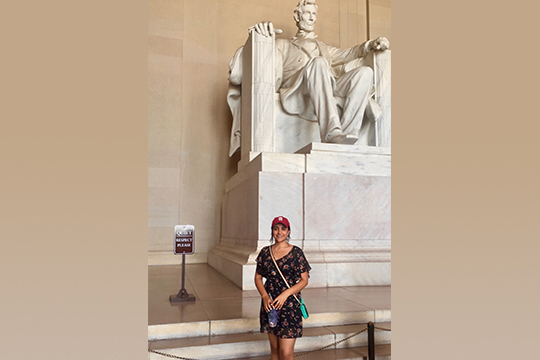
Advocating for responsible energy use
By Sadaf Sobhani, B.S./M.S. ’15; PhD Candidate
I spent last summer in Washington, DC working as an intern at the Energy Future Coalition, an initiative of the United Nations Foundation (UNF). As a PhD student in Mechanical Engineering, I work on developing computational tools to investigate alternative combustion systems. I spend most days writing code or discussing the technical details of my research. So the transition to Pennsylvania Ave was dramatic. Just the walk from the Farragut North station to my UNF office, located between the White House and the World Bank, was enough to remind me of the incredible opportunity I was given to work in the nation’s capital.
During the summer, I was involved with the Clean Fuels campaign, which calls attention to the epidemiological and environmental risks associated with the combustion of aromatic compounds in fuels. With my background in combustion science and engineering, I was able to contribute to the team’s efforts by translating the current scientific research into a comprehensive white page on the sources and potential impacts of emissions from automobiles, focusing on the influences of specific gasoline components and ethanol-gasoline blending. My work aimed to give insight into potential technical and policy responses to this issue. Through this experience, I gained a deeper appreciation for the complex processes involved in developing and implementing policies that advance us towards a more sustainable and cleaner energy future, a journey that I want to be actively involved in – both as a scientist and an advocate.
Schneider Fellows work at leading U.S. nongovernmental organizations (NGOs) to tackle today’s sustainable energy challenges.
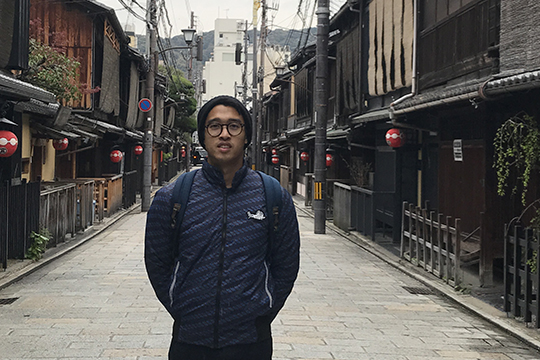
Complex, messy – and rewarding
 By Paricha Duangtaweesub, MS ’15 (Chemical Engineering)
By Paricha Duangtaweesub, MS ’15 (Chemical Engineering)
“What do you want to do after school?”
I rapidly became familiar with this question during my graduate studies, and soon I found myself responding with one version or another of the same response: “I want to apply what I learned to make an impact in renewable energy.”
I was a naïve student of chemical engineering then, cherry-picking engineering classes in renewable energy, crossing over to the GSB and d.school to round out my education. I thought social impact work would be straightforward and well defined, with the benefits as measurable as my grades or the applause after presentations. Did I mention I was naïve?
With much excitement, I accepted a summer Schneider Fellowship at the Natural Resources Defense Council in San Francisco right after graduation where I contributed to advocacy work in energy efficiency policy in California and India. Between studying technical potential of bio gas, writing comments to an ordinance proposed by the City of Palo Alto, and preparing a case study of building codes for Hyderabad, the learning experience was both challenging and rewarding.
I found that systems of people can be far more complex than any mathematical models taught in class. It is imperative that we understand the different needs of the stakeholders within the system that we promised to help – city residents, politicians, business owners, and government agencies – as well as the environment. As an engineer, I learned an important lesson: that technical knowledge is only part of the answer.
Schneider Fellows work at leading U.S. nongovernmental organizations (NGOs) to tackle today’s sustainable energy challenges.
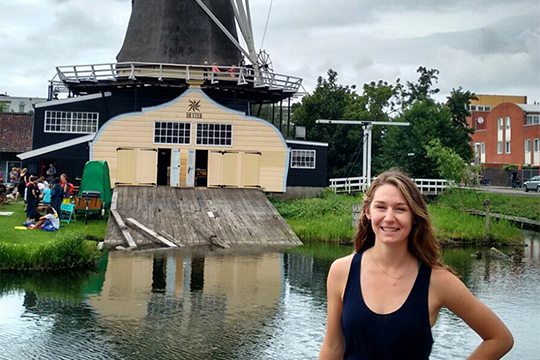
Greening cities
By Amy King, ’16 (Earth Systems); MS ’17 (Civil & Environmental Engineering: Atmosphere & Energy)
I make a quick stop at a café in Vondelpark before continuing my bike commute through Amsterdam en route to the office on the canal. Bike friendly and full of open spaces, Amsterdam is a model city for sustainability, and I contemplate its merits as I bike along the ancient streets.
Through a Schneider Fellowship, I worked six weeks in Washington, DC and six weeks in Amsterdam for the U.S. Green Building Council, producing the Global Real Estate Sustainability Benchmark Report, an annual account of how hundreds of international properties are striving for sustainable practices in their built environment.
Working with a multicultural team dedicated to urban sustainability, I edited and published the Innovative Case Studies section of the report, discovering along the way the wild ways companies are cultivating green practices in their business and buildings. One company had started a beekeeping program on their green roof, encouraging community and a buzzing bee population. Sharing these creative case studies showed me the green goals of big business, and gave me great hope! Discovering the impact possible in creating a greener built environment shifted my career trajectory from conservation to sustainable design, knowing I can best serve the natural environment by shaping the built one.
Schneider Fellows work at leading U.S. nongovernmental organizations (NGOs) to tackle today’s sustainable energy challenges.
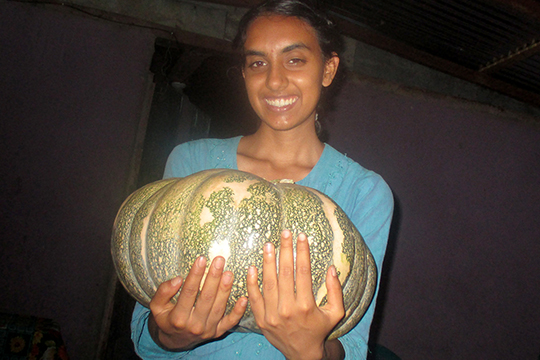
Caring for what we have
By Sneha Ayyagari, ’17 (Environmental Systems Engineering); MS ’19 (Civil and Environmental Engineering: Sustainable Design and Construction)
“Development is when people grow their conscience.” That is how a war veteran, skilled farmer, and environmental educator described to me what it means to create sustainable development. He explained that it doesn’t matter how much people do or don’t have; what matters is that they care for and care about what they have.
As a Schneider Sustainable Energy fellow in 2015, I worked with Asofenix, a grassroots organization that works to develop and improve the lives of rural Nicaraguans in the villages in the hilly state of Boaco. Throughout my fellowship, I supported projects that improved quality of life such as installing renewable energy, potable water infrastructure, irrigation systems, and clean cookstoves; creating an environmental education program; and supporting sustainable agriculture in the community where I worked and lived. I saw how the technical and educational parts of energy projects fit together into an integrated and transformational program. I was deeply moved by the opportunity to learn the stories of the resilient and loving people I worked with.
I also enjoyed learning the nuances of Nicaraguan culture, and the people I worked with became part of my family. I continue to call them every week. This fellowship reinforced my desire to couple my technical skills and interest in environmental engineering with my passion for teaching to create a more just and sustainable world.
Schneider Fellows work at leading U.S. nongovernmental organizations (NGOs) to tackle today’s sustainable energy challenges.
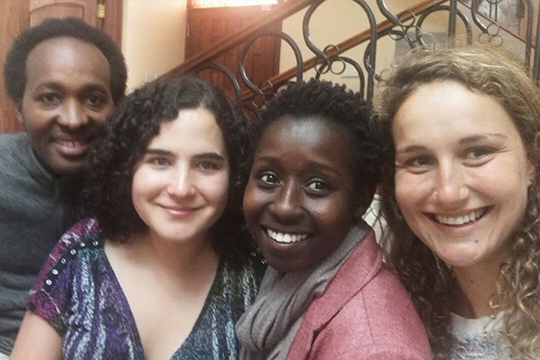
Research rooted in public service
by Ashley Jowell, ’17 (Human Biology) and Sharon Wulfovich, ’17 (Human Biology)
The sun was setting upon Arusha, Tanzania, as we joined together for an evening discussion. We, along with our translator, Jenipher, and project manager, Sianga, enjoyed our home cooked meal in celebration of completing our 16th interview. Our faces were glowing as we sipped our tea, finished our last bites of mchicha, and discussed the data we collected as well as its potential impact. The stories Maasai women shared had been informative, alarming, and inspiring as they described the impact that moving to Arusha from their village had on their lives. How, we discussed, might we use this research to benefit the women facing such hardships upon migrating? This was a conversation we would continue to grapple with throughout our entire project and on-campus conversations.
Our research, designed in collaboration with The Future Warriors Project, a Maasai-run NGO created by Sianga, involved interviewing female Maasai migrants who had moved to Arusha. While both researchers were looking at the impact of this journey on their health, Sharon’s project focused on health decision making behavior and Ashley’s focused on resilience and identity. As the four of us bounced ideas, we felt honored to conduct research that strove to benefit the community we were so privileged to serve.
Ashley is a member of the Public Service Scholars Program at the Haas Center, where she has continued engaging in discussions on scholarship & ethical service.
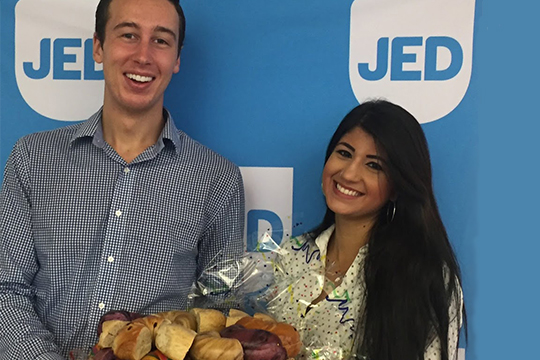
Community building amid high-stakes work
By Carter Osborne, ’17 (Political Science)
If you’ve never tried a New York bagel, you’re really missing out. I never could have foreseen my obsession with these rings of boiled bread, but there I was this summer, so enamored with them that I persuaded my coworkers to join me in a new lunchtime office tradition: bagel Tuesday. It was probably a bit goofy for an office setting, but such was the extent to which I felt at home with the phenomenal employees of the Jed Foundation (JED). I fit right in with the staff, and through 10 weeks of work with them, I got to observe and briefly experience both the fun and emotional challenge of their jobs.
JED is a Manhattan-based nonprofit that works to reduce rates of suicide and substance abuse among young adults. Through the Urban Summer Fellowship, I got to spend every day this summer immersed in powerful conversations concerning the emotionally weighty topic of suicide. And while my projects were sometimes emotionally difficult to complete, their potential impact on college students across the country always inspired the motivation required to keep pushing further. And of course, the endless positive energy in the office taught me how to balance my work with a fun lifestyle. My time with JED was challenging and hilarious and, at times, heart-wrenching, but I can honestly say that with everything considered, I wouldn’t trade my summer with JED for all the bagels in Manhattan.
Carter is a 2016-17 fellowships peer advisor.
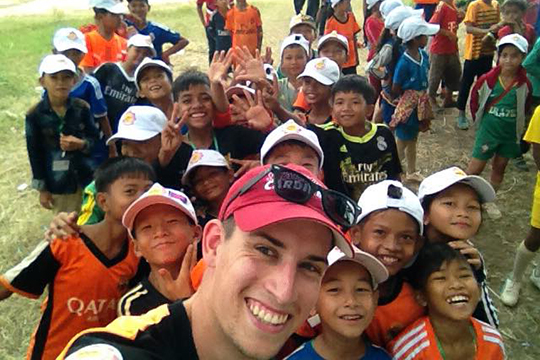
Using sport to engage youth
By Eric Fabre, ’16 (International Relations)
Applause broke out as Ed Foster-Simeon, CEO at the US Soccer Foundation, closed out the 2016 Soccer for Success National Training. It was the fourth and final day of the event, and the emotion from days of hard work was tangible in the room of this Washington, DC hotel. I had been at the Foundation for only 2 weeks, but in that short time had already witnessed the amount of time and effort that was put into this event. Over 150 people from around the country had flown into DC to learn how to run a local after school soccer program, designed by the US Soccer Foundation and their partner communities. I had been a small part of the implementation of the National Training, and felt humbled to be in the same room as so many people that have been true catalysts for change in their respective communities.
This moment stands out to me from my summer as a Donald Kennedy fellow because I realized that everyone in the room had chosen to use our program to create positive change in their communities. They believed that using sport was the best way to engage youth and affect their lives in a positive way. Seeing the emotion as they watched the final speech and the hugs and handshakes that went around as they said their goodbyes to their fellow coaches told me all I needed to know: this was the work I wanted to do, and I was proud to support these people in their community work.
Eric is a 2016-17 fellowships peer advisor.
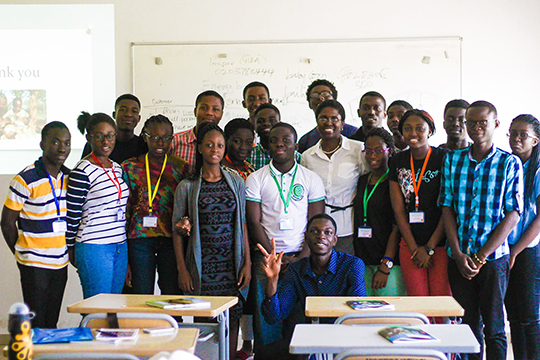
A summer of teaching and learning
By Brian Fleischer, ’19 (undeclared)
It was under the hot Accra sun that I realized why I was back home, why I was among this amazing group of students, and why I was doing this work in the first place.
When I received the Donald Kennedy Fellowship to work with high school students to propose and develop innovative solutions to problems they had discovered within their communities, I was still unsure if that was how I wanted to spend my summer. I was also unsure if I would be capable to lead the cohort of peer mentors and generally facilitate this project.
Not long after interacting with these students I realized that this was also a learning experience for me and a chance to immerse myself within and discover myself. I got to know and understand to some extent the various problems these students encountered and marveled at the novelty and practicality of the ideas presented. From “P-Coal,” a greener and cheaper alternative for charcoal made of waste, to “Senior Smile,” a youth movement for the neglected elderly, these ideas proved to the students themselves, their communities, and myself that the youth are indeed central drivers of positive change within their communities.
It was under that hot Accra sun that I realized that I was there to find myself.
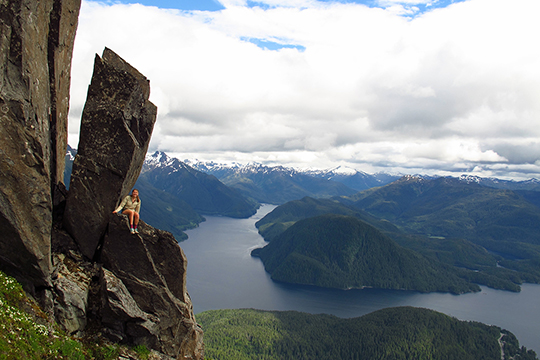
Real people affected by a warming world
By Sienna White, ’19 (undeclared)
I spent two months this summer living in Sitka, Alaska, working on a radio show about climate change. They were two long months full of rain, clouds, and watery sunlight, with a sky that never really went dark. Every day I’d walk three blocks down to the Island Institute and hole up, editing audio, calling people, reading. The work itself was fascinatingly behind-the-scenes. You read a lot about climate change up north. Part of it is science: Arctic regions are warming at nearly twice the rate of their equatorial counterparts. The effects of climate change are hauntingly dramatic. Houses fall into the sea. Glaciers disappear. Tides turn red.
But aside from the booming drama, what’s missing so often from these stories are the people who call these places home. Through the radio show, we hoped to explore all the nuanced connections people have with place, and the fragile grief inevitable with a warming world. I listened to hundreds of voices, through interviews and my headphones, and with every reflection, tangent, and fragmented thought, I felt as if I was honing in on something. I couldn’t quite tell what I was feeling—empathy? understanding? perspective?—but it felt important, it felt thoughtful and shapeless, and I was thankful to feel it, whatever it was.
